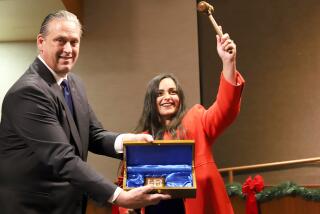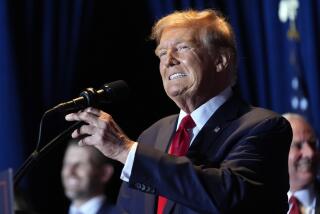In South Carolina, an ex-governor’s quest continues
CHARLESTON, S.C. — At a harborside reception overlooking Ft. Sumter, where the Civil War began, Mark Sanford batted away a TV reporter’s question about the latest insult to his comeback campaign: an unwanted endorsement from pornographer Larry Flynt.
Hours earlier, the former governor had been asked about a billboard message on a South Carolina interstate from a marital infidelity website. Under a blowup of a grinning Sanford, the site advised him to use its online service to find his next “running mate.”
“South Carolina is the land of strange politics,” replied Sanford, the Republican nominee in Tuesday’s special election for a vacant House seat. “You never know quite what’s coming in the last week of a campaign.”
Driven from politics by a notorious extramarital affair with an Argentine mistress — in which he tried to hide a tryst by claiming he was hiking the Appalachian Trail — Sanford has spent months parading his shortcomings up and down the Low Country. He seeks forgiveness for what he calls his “fall,” and redemption for a career that once seemed to have limitless potential.
Along the way, the onetime presidential prospect has been outspent by a novice Democrat, abandoned by his national party, held at arm’s length by state GOP officials and drawn back into court by his ex-wife, Jenny Sanford.
All that has turned the race into a tossup, an unexpected situation in a coastal Carolina district that is heavily Republican. But for Sanford’s personal baggage, the contest would not be close, as even one of his opponent’s advisors privately admits. That is unlikely to prevent Democrats from crowing if they pull off a victory here in an election that gives them their first chance during President Obama’s second term to chip away at the GOP’s majority in the House.
Perhaps inevitably, given the Republican candidate’s personal history, the race is ending in a torrent of negative advertising, much of it centered on the war between the Sanfords. Outside Democratic groups have put close to $1 million behind his opponent, Elizabeth Colbert Busch, known as Lulu to her friends but better recognized as the sister of Comedy Central star Stephen Colbert. In recent months, she has raised more than twice as much as Sanford.
A newcomer to politics, the Democrat has kept a very low public profile, making few speeches and debating Sanford only once, at a forum that wasn’t broadcast on TV. But her merciless ads attacking his character, designed to depress the Republican vote, have flooded this district, which Democrats last won in 1978. One theme is that Sanford, who has a well-earned reputation for fiscal austerity, spent taxpayer money to visit his mistress, then “lied to cover it up.”
A radio commercial aimed at black voters, who make up almost one-fifth of the electorate, plays on resentment over what an announcer describes as Republican efforts to suppress black votes. The Democrat’s ad links those efforts to Sanford, who “took a hike on the people of South Carolina.”
Details of Sanford’s eventual split from his wife, whom he still mentions at campaign appearances, are well known throughout the Charleston area. But the saga has taken a new turn in the closing weeks of the campaign. Court documents showed that Sanford had been ordered to appear before a judge on Thursday, two days after the election, to explain why he shouldn’t be held in contempt of court for violating terms of the 2010 divorce agreement, which prohibits him from visiting his ex-wife’s house without permission.
Jenny Sanford’s complaint accused her ex of a pattern of unwanted visits, including one on Super Bowl Sunday, several weeks after he’d become a candidate, when she came home to find him leaving by the back door. Sanford has acknowledged that he was there, explaining that he merely hadn’t wanted one of their teenage sons to have to watch the football game alone; later, he admitted that another son also had been in the house.
When the trespassing complaint came to light, the national Republican Party’s congressional campaign dropped its support for Sanford’s candidacy — and a new line of attack had been created.
A Democratic “super PAC” ad, directed at female voters, features a former Sanford supporter who says that the latest developments left her feeling “mortified, angry, embarrassed, betrayed.” Another negative ad from the same group features a retired Army combat veteran of the conflict in Afghanistan who says that Sanford “betrayed all of South Carolina” by going AWOL while he was governor.
Sanford, once a prolific fundraiser and a favorite on Wall Street, has struggled to attract campaign cash. Some past donors, such as industrialist David Koch, one of his largest contributors, continue to provide support. He has also received some assistance from the tea party group FreedomWorks, and endorsements from House Speaker John A. Boehner (R-Ohio) and from libertarian favorites Ron Paul and his son, Sen. Rand Paul (R-Ky.), a likely 2016 presidential candidate. (South Carolina hosts an important early primary.)
But prominent South Carolina Republicans have been avoiding him. Sen. Lindsey Graham and Sen. Tim Scott — whose appointment to the Senate created the opening that made the special election necessary — limited themselves to issuing written endorsements. Republican Gov. Nikki Haley slipped into Charleston for a private Sanford fundraiser on Wednesday evening, but did not appear in public with him.
Though swamped on the airwaves, Sanford has been able to exploit stumbles by his Democratic opponent, who was caught on video praising organized labor. She also accepted a donation from the PAC representing the Machinists union, which had outraged many in the Charleston area when it attempted to block Boeing from building 787 Dreamliners at a new local plant.
Sanford has sought to tie Colbert Busch to Rep. Nancy Pelosi — at one point traveling the district with a life-size photo of the San Francisco Democrat — while portraying himself as a target of Democratic efforts to return her to the House speakership.
Late-deciding voters are likely to make the difference in what is expected to be a low-turnout election. Many are women, like Neita Wiese, a small-business owner who sells salad dressings and marinades. Twice divorced, she blushes when she says that she voted for Sanford in the primary because of his experience, but may choose Colbert Busch.
“I like Elizabeth,” said Wiese, praising the Democrat’s work on local development and international trade at the port of Charleston. But she says the timing of the complaint against Sanford by his ex-wife troubled her, adding that “it makes him more sympathetic to me.”
Renee Anderson, who also has been through a divorce, says she’s not focused on Sanford’s personal life, even though she doesn’t condone his behavior.
“Character matters, but so does experience in Washington,” said the undecided independent, referring to Sanford’s three terms during the 1990s in the same House seat he is seeking to reclaim. Anderson, a longtime education administrator and civic activist, is “thrilled” that Colbert Busch is running and says that South Carolina needs more women in government. But she worries about the Democrat’s support from unions, and said, “Nancy Pelosi is not the influence that I can support.”
Sanford has done what he can to move the focus away from himself and onto the national political picture. At a Rotary Club last week, he said the matchup would be a “litmus test” for efforts by Obama and the Democrats to win back the House.
“The reason they put $1 million into this race is because it has national significance for them,” said Sanford, who worked briefly as a paid commentator for Fox News after his term as governor ended in early 2011. He told reporters that a Democratic victory would enable party leaders to make an argument to prospective donors that “if we won in the first congressional district of South Carolina, we can win the other 15 seats requisite to taking back the House.”
Never at a loss for words, Sanford seemed to have been brought up short when a reporter asked him to reflect on what it had been like to have the details of his personal life dredged up in a race that he could well lose.
“You know, I’ve said pretty much everything I could possibly say about that and more,” he replied, with a slight chuckle. Then he went on, haltingly, “I’d just say, you know it’s been, uh, uh, uh,” — he paused — “you know, uh, you know, uh, an important race, a tough race, and we’ll see what the voters decide come next Tuesday.”
More to Read
Start your day right
Sign up for Essential California for news, features and recommendations from the L.A. Times and beyond in your inbox six days a week.
You may occasionally receive promotional content from the Los Angeles Times.






